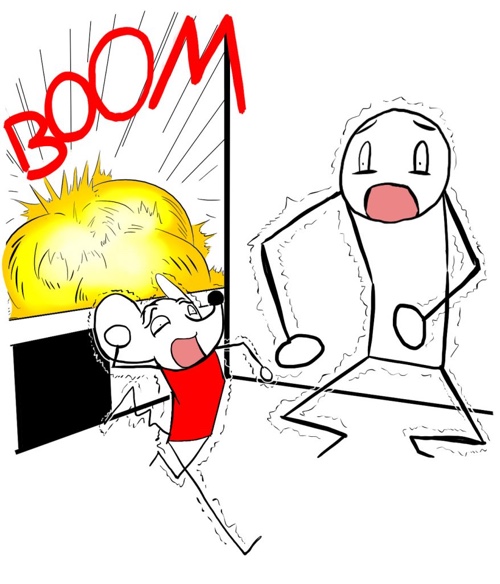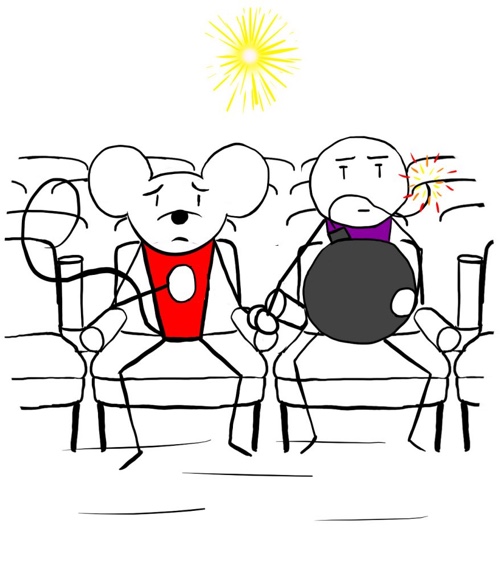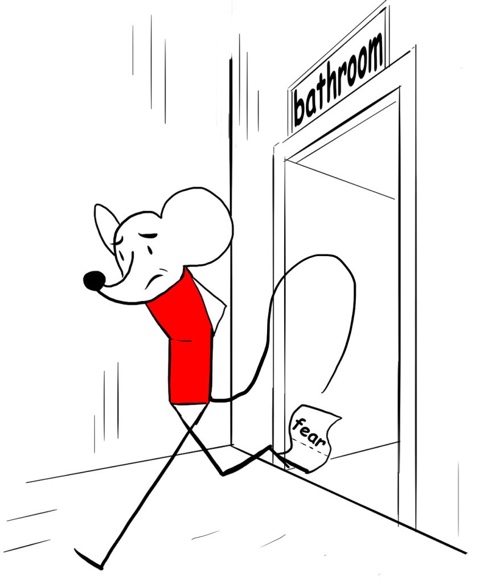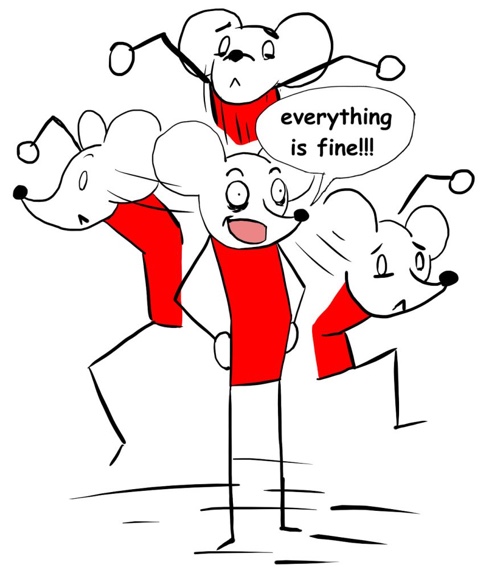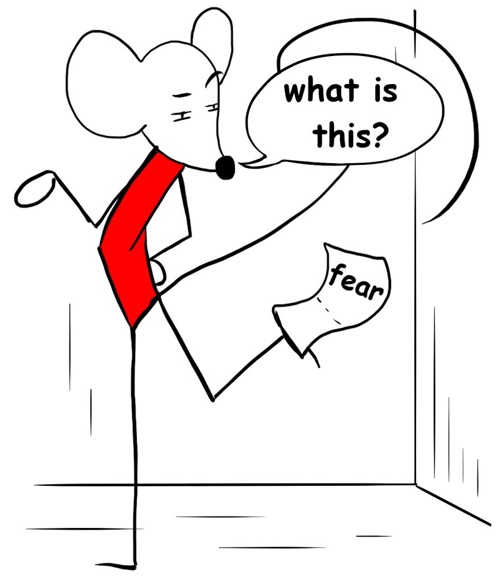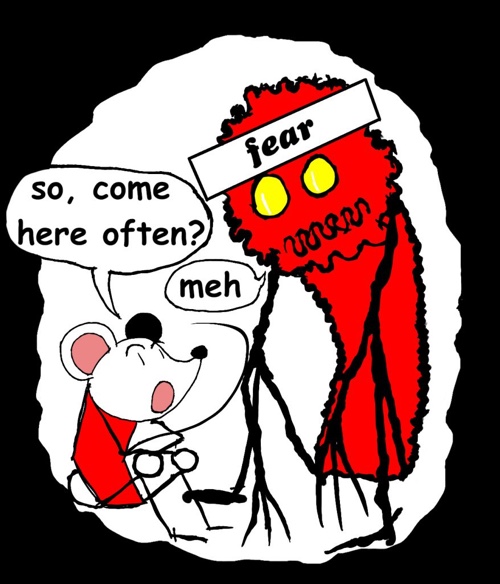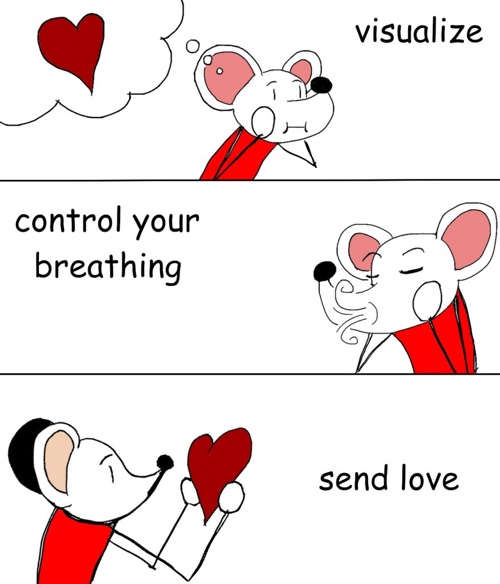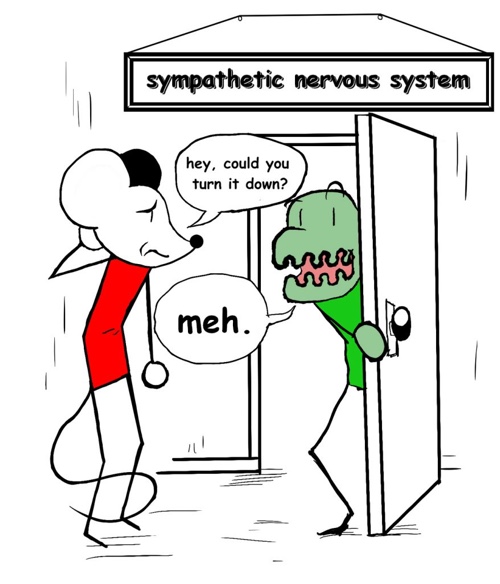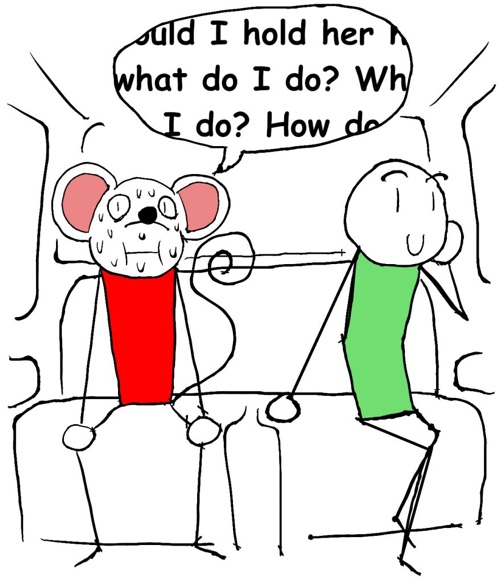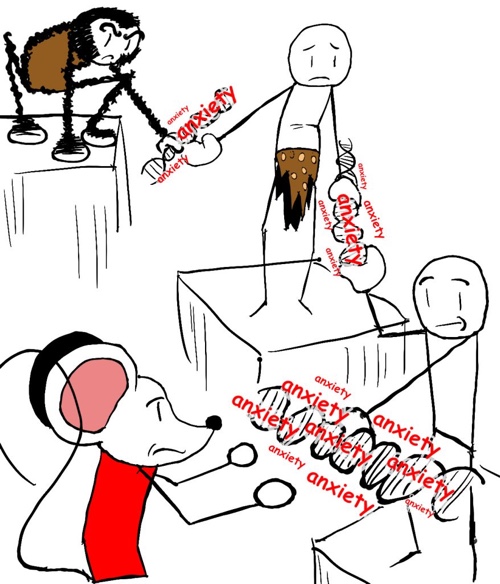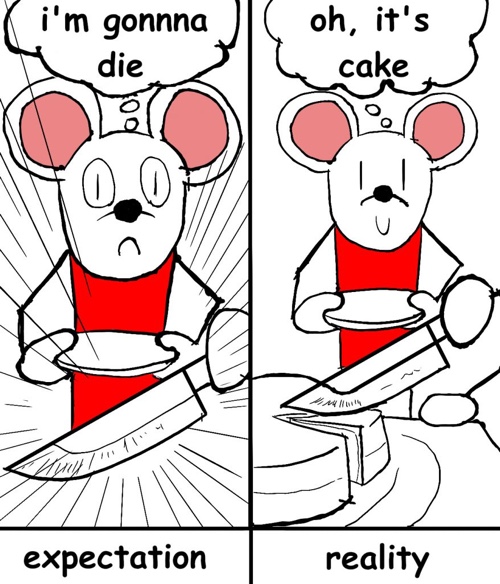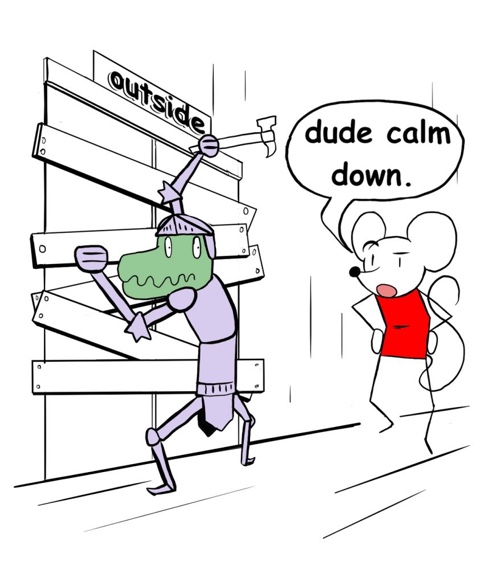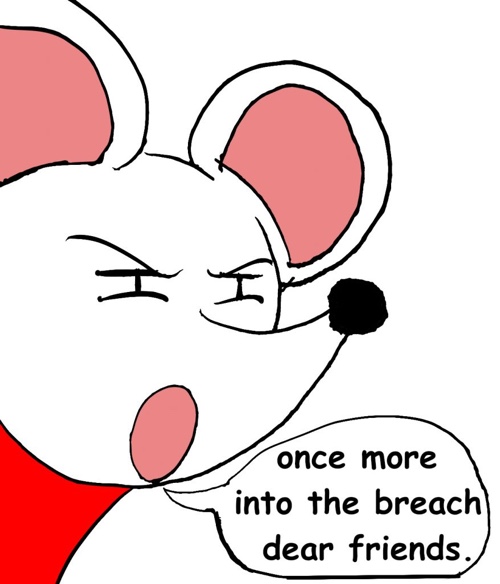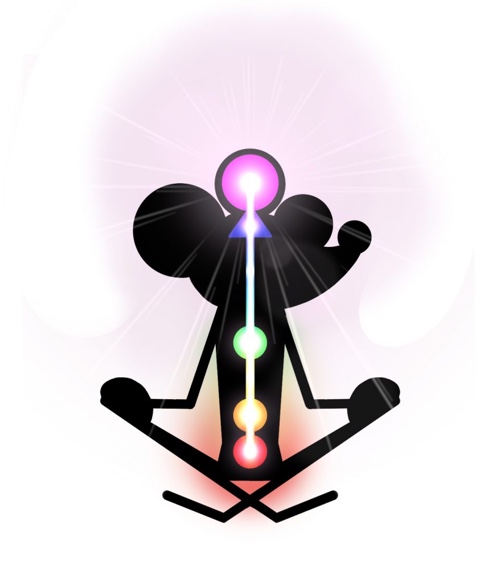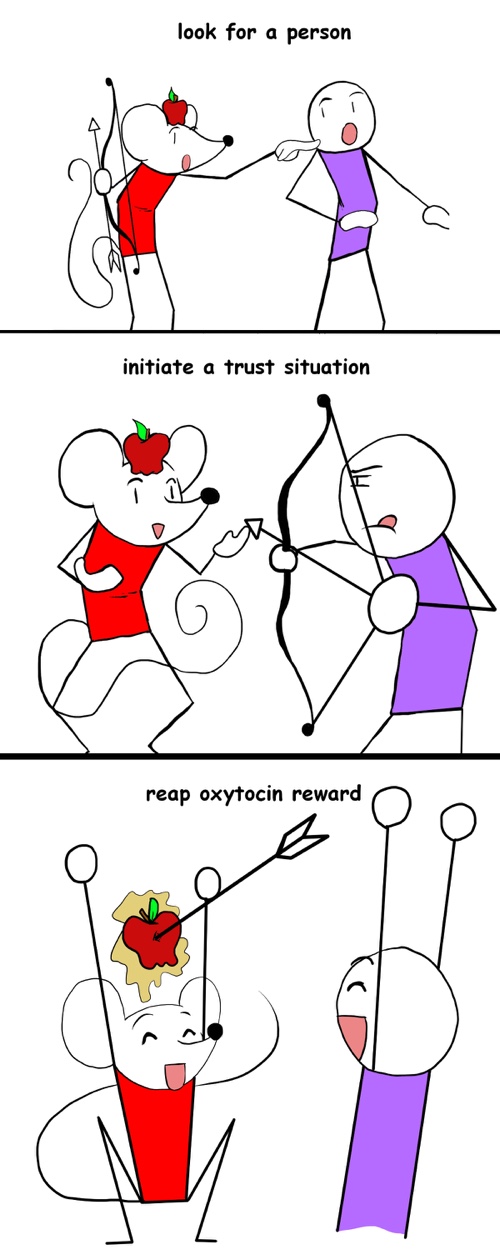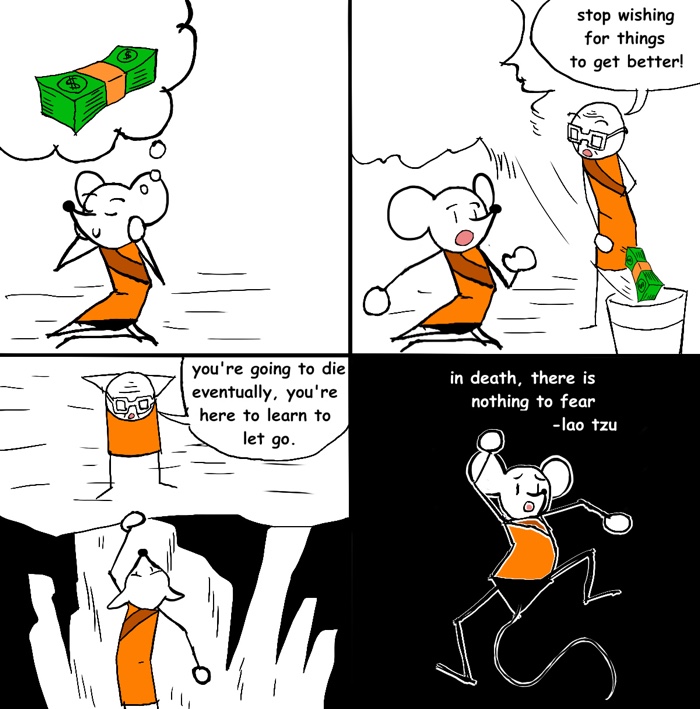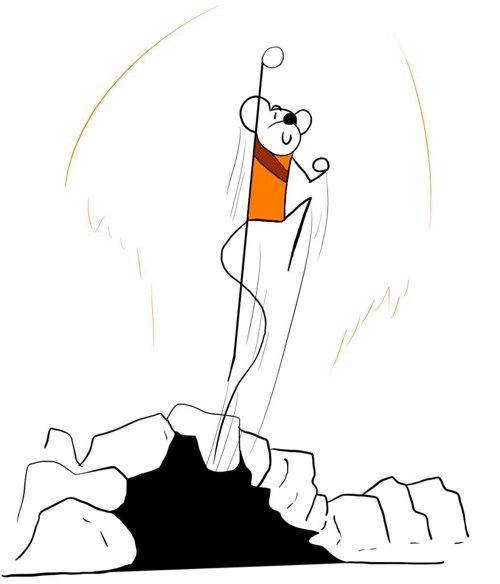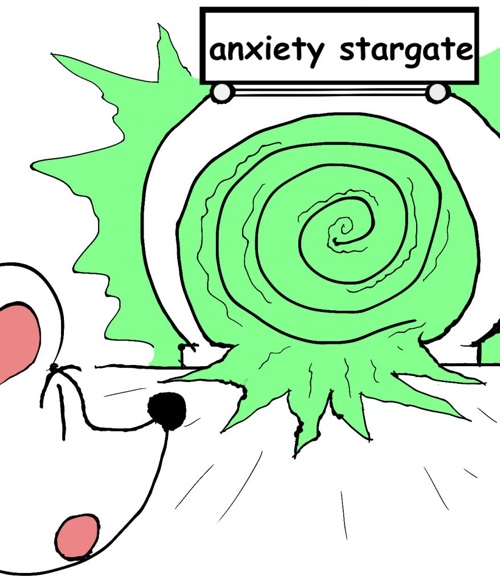Lessons in coping with anxiety.
I’m on the balcony playing with pegs. Not quite two years old. Out of nowhere a bomb drops from the sky and explodes nearby. It’s a huge shock to my little heart. I scream. My sympathetic nervous system injects me with adrenaline and cortisol, propelling me like a rocket into my father’s arms.
I grow up in a war zone.
Living in war is like being in a relationship with an emotionally volatile person. You spend years walking on eggshells, not knowing when they’re going to blow up next.
I’ve experienced both. Growing up in war and being in a relationship with a volatile person.
Gradually, and without my awareness, I lose my sense of safety.
Even long after I leave the war zone and that relationship ends, my anxiety remains. Just like a piece of toilet paper that gets stuck to your shoe long after you’ve left the restroom, anxiety follows me around.
And even though the world shows me everyday that it is a gentle and safe place that’s full of love, my body still expects everything to go to hell without warning.
When I look back on my life I can see how this stuck-fear turns me into a tiny Anxiety Mouse.
As an Anxiety Mouse I’m afraid to leave a job that doesn’t utilize my full potential because I don’t know what will happen if I do.
As an Anxiety Mouse, I’m afraid to ask the woman I like if she’s interested too, because I fear the sting of ridicule or rejection.
As an Anxiety Mouse I abort many potential friendships because I don’t trust people’s intentions.
And so when I finally become aware of how my fear oppresses me, or how I oppress myself with my fear, I set out to transform it.
And in coping with anxiety, these are the lessons I learn.
Love anxiety mouse (with all your heart)
It takes me many years to even realize that I am afraid. Scientists say that when your body is used to being in a state of alert for so long, you stop noticing that it is on edge; it becomes your new normal.
In Life Unlocked, Srinivassan Pillay writes that certain brain regions involved in fear can be active without our conscious awareness. We can be afraid and just not know it.
I first notice my subliminal fear in the backseat of a coworker’s car. I’m in my mid 30s. She’s very nice and invites me to spend time with her and a friend. But for some reason my chest constricts and I want nothing more than to get out of there.
Instead of berating myself for this social failure, I turn toward my fear with curiosity and unconditional self-love.
When I get home, I do a meditation prescribed for people coping with anxiety by Christopher Hansard in his book The Tibetan Art of Living.
I lie on my back and close my eyes. I imagine that my breath is flowing in and out of my navel. And with every breath I feel warmer and more energized. I place my attention on my heart and I feel the anxious glow that emanates from it. It’s an icy cold, electric heat.
I then imagine a miniature me lying in the center of my heart, just as Hansard instructs. She is perfectly safe and perfectly at peace. Nothing can harm her. And I sit with this perfect peace, together with my fear, for some time.
I learn from Hansard’s book that this peace is actually my inner wisdom and it is always there, accessible in the space between moments. For the ancient Tibetans, he tells me, this inner wisdom is the healer of the body and mind. In knowing how to contact this inner horizon, as he calls it, lies our ultimate healing. I now direct the image of my safe-self out of my heart and into the world. I color it with a bright, powerful light and allow it to radiate like a white sun. I let its rays permeate every aspect of my life.
Rest and let yourself receive the good feelings that come to you from doing this, Hansard writes. And I do.
I have just communicated with my sympathetic nervous system with guided imagery. I’ve brought the fear response under my sway.
When I am not meditating I blast Anxiety Mouse with light and love every chance I get. Every time I notice her. Remembering the not-yet-two-year-old girl on that balcony, who was terrorized within an inch of her life, I wrap my now strong arms around the afraid parts of me and love the hell out of them.
Wherever the fear is nesting in my body, I direct love with all my heart at it. Ultimately, it’s not our technology or our medicine but our love that heals. That’s what neurosurgeon James Doty writes in his book Into the Magic Shop, and that’s a neurosurgeon talking!
In the past I thought these ancient visualization techniques were archaic wishful thinking, now I realize they are truly medicine.
Feel the Fear and Do It Anyway
I’m sitting in the back seat of a taxi. Next to me sits the object of my affection. I’d really like to ask her out for dinner but I just can’t. I’m so tense, if I was a guitar string I would snap.
I’ve already read a dozen books on body language and nonverbal communication and I can tell I’m giving her all the wrong signals.
You’re supposed to lightly touch your love interests here and there: on the arm, a little slap on the knee, maybe even a light touch on the small of the back if you’re ushering them through a doorway.
If you have hair, flick it.
And you’re supposed to make meaningful and non-invasive eye contact when they speak. Ask a lot of questions. Dress to impress. Connect emotionally. Yeah, I get it. All of it. But I just can’t bring myself to put my hand on a woman I’m attracted to.
What if she feels violated? What if I come across as sleazy? What if she’s straight and I misrepresent all gay women as predatory sex fiends for all time?
So you see, I just sit there, awkward and uncomfortable. Stewing in my closed off stance, my body turned away from her.
She’s talking but I’m so caught up in my own nervousness, I have no idea what she just said. Seconds later she’s out of the taxi. Gone. I just missed my chance.
I go home and I’m really tempted to hate myself. What a coward. I keep replaying our time together in my head, looking for clues. Does she like me? It never occurs to me that I could have just asked.
The fastest way to deal with anxiety is to do the thing that scares you. Once you’ve done what you’re afraid of, it can’t scare you anymore. That’s because anxiety is only possible when you think about the future and about what could happen.
So feel the fear and do it anyway. This is literally the title of a best selling book by Susan Jeffers.
Jeffers teaches me to say I’ll handle it, every time I catch myself worrying about the consequences of doing something. I just keep saying it over and over again, every time Anxiety Mouse rears her fragile little head inside me.
If I keep giving all my money away, I’m going to end up homeless myself: that’s fine, I’ll handle it.
If I quit this job I’m really not cut out for, I might never be able to find something better: I’ll handle it.
What if America turns fascist and they start rounding up immigrants: I’ll handle it.
What if I go on vacation and come back to find that my startup doesn’t exist anymore: I’ll handle it.
Whatever you fear is going to happen that you’re theoretically worrying about right now, just tell yourself, I’ll handle it.
And if the worst case scenario eventuates (it almost never does), Jeffers says in another book, tell yourself I can learn from this.
I’ve just blown my last chance with this incredibly amazing woman by not asking her out. I can learn from this.
I’ve just blown the entire fuse box fixing the electrics on my motorcycle. I can learn from this.
After I finally overcome my fear of losing money and start investing in the stock market, it crashes! I can learn from this.
I do learn a tonne from that last one, actually. I realize how ridiculous money is; how easily it can be made and lost. My fear of not having enough is transformed into my knowledge that material security is an illusion.
It doesn’t make sense to continue being afraid of losing something (material security) that no one can ultimately have, does it?
Put fear in a larger historical context
My heart rate can go from 60 to 100 BPM instantly for no seemingly good reason.
The first time this happens to me, I’m in high school. I see two police officers walking towards me and I feel the fear. I do a mental check of my school uniform.
It’s a crazy thought to think that police officers are going to cite you for not having your shirt tucked in, isn’t it? They pass me without incident of course and I’m left wondering what the hell my reaction was all about.
The same thing still happens to me sometimes when I see Border Patrol officers in foreign airports. And during the 2014 Ferguson protests I break into a cold sweat when a police helicopter hovers over my house for over an hour. I’ve been in war zones, why should a police helicopter make me feel like it’s coming for me?
None of this makes sense to my logical mind. The physiological reactions happen in spite of my logic.
In search for self-understanding, I come across the concept of epigenetics. Epigenetics teaches us that we can inherit the traumatic experiences of our predecessors even up to the moment of our conception.
What this means is that what happened during the lives of my parents and their parents lives inside me too.
And so it all starts to make sense.
My grandparents had to flee their family homes, they and my parents were persecuted. They lived in constant terror, hiding from genocidal militias for decades.
Now that context is gone, but thanks to epigenetics my brain is still vigilant against those non-existent threats. I soon realize that Anxiety Mouse wants to make sure I survive in a world that no longer exists.
I take a moment to honor the experiences of my parents and their parents before them. I close my eyes and I bless the souls of the living, and the souls of those whom we have lost.
My eyes well up with tears as the fear that sits inside me takes on a new meaning. This fear is not an enemy but a precious relic from my family’s history that is asking to be acknowledged and healed.
I imagine that as I am healing my own trauma, I am also healing the trauma of my entire lineage. I feel the spirits of my grandfather, aunts, uncles and cousins who were murdered in the war and to each one of them I acknowledge the pain and terror they must have faced.
I take a moment to imagine what they would say to me and I listen for their messages.
May you be happy, may you be at peace. Thank you for your sacrifice. I promise to live the life I am given to its fullest potential.
I bless the living spirits of my mother and father.
My heart radiates tremendous love and the electric ice-cold fear transforms into a tender aching, like the pain of a fresh wound. I feel my heart opening to the unhealed traumas of my predecessors and I ask that they be released now and for all time.
Bert Hellinger, a German psychologist who invented a therapeutic methodology known as Family Constellation Work, claims that we can inherit the traumas of our predecessors and live out similar fates to them if these experiences are not brought to consciousness and resolved. He calls this phenomenon systemic entanglement.
We might even harbor a sense of unconscious loyalty to our fallen loved ones and end up steering ourselves toward similar fates in solidarity with them. Ivan Boszormenyi-Nagy, a hungarian psychologist who founded family therapy, refers to this phenomenon as invisible loyalty.
My body, without my conscious awareness, makes me live out the same psychosocial distress as my predecessors. My body is motivated by unconscious love and deep family ties that live in the cells of my body. As I become aware of this dynamic the healing begins and I set out to write a new destiny for my life. One based on optimism and trust.
Take a moment to expand your awareness of that steel-cold existential fear that doesn’t seem to leave you alone. What aspects are based on your direct experience and what aspects could you have inherited?
Take a moment to acknowledge the pains and losses of your loved ones. The ones you know and the ones you don’t. Ask that they be acknowledged and healed. Surrender the pain to the greater love that governs and corrects all things.
Subliminal fear lives in the unconscious mind
I post on an online forum about a rare motorcycle part I need to repair my bike. The following day, I receive an email from a man named Steve telling me has has the part and to call him on a given number. My first thought isn’t oh, great! My first thought is is this a scam? I put the phone number into Google and sure enough, Steve is calling from a motorcycle salvage yard in Southern California.
Someone else wouldn’t have had that thought. But that kind of thought is my default mode. It’s the first thing I think in most situations. Is there a threat? How can I make sure there isn’t a threat? How can I keep myself safe?
I’ve lived with this way of thinking for so long I barely even notice it, but now that I can see my subliminal fear in action, I can also see how it’s interfering in all aspects of my life.
For one thing, I don’t trust my friends. This means I can never rely on them. And because I don’t give people the chance to be there for me, I’ve ended up with a lot of superficial relationships. Unintentionally, I have been isolating myself from others in this way for years.
Another example is that I never trust that things will work out for me, or that I might just get lucky. This means I don’t take risks and it also means that undesirable circumstances in my life are slow to change.
I realize that for drastic changes to occur in my life I need to create momentum by taking bold action. But since I’m subliminally afraid all the time, I haven’t dared to quit that stupid job.
I recognize that I need to go deep into my unconscious mind to fix this.
And I quit that stupid job.
Releasing stuck energy
The unconscious mind is that part of ourselves that carries out the bodily functions we don’t have to think about. Things like a beating heart, breathing, digestion and life-saving reflexes. My unconscious mind is the one that’s running my fear factory because it still thinks I need it to survive.
I need to find a way to tell it that there is no threat. I need to find a way to tell it all is good. The war (at least for me) is over, if I run out of money I’ll handle it, and there’s really no one out to get me. And if there were, I’ll handle that too.
I’m sitting in my bedroom after a long day of reading and writing on my desk.
I have no reason to be afraid and yet there is a knot in my stomach. Above that, in the center of my torso and radiating all the way up to my heart, I also feel a stuck energy. I am not thinking anxious thoughts, I am simply observing the sensations we would normally call fear as they manifest in my body.
My Sympathetic Nervous System is on alert, it’s ready to respond to threat. Except there is no threat and I know this, but my body doesn’t.
How do I tell my body everything is ok?
I soon realize that the sensations of anxiety that I am feeling in my body are located in what Eastern mystics call chakras. Chakras are energy centers in the body. For a long time I thought they were just make belief. But I can definitely feel this excess energy in the places where the second, third and fourth chakras are supposed to be.
In his book Becoming Supernatural Joe Dispenza puts the idea in my head that these energy centers can experience blockages because of past traumatic experiences. Sometimes an energy center can move away from its alignment with the spine.
The idea makes sense because the sensation I feel in what’s supposed to be my second chakra is not in alignment with my spine, it juts out slightly to the left. After his meditation technique, Dispenza says, practitioners notice a realignment of those energy centers with the spine and the energy flows freely again.
I’m willing to have an open mind about this. If these energy centers are real and my unresolved emotional experiences of being threatened are actually stuck in my body, then if I do this meditation, I should be able to feel the difference.
I close my eyes and prepare myself for the breathing exercise he prescribes. I squeeze the muscles of my pelvic floor as well as the muscles of my lower and upper abdomen in tandem with inhaling a deep breath. At the same time, I imagine that I am using my core muscles to move the energy in my lower chakras up my spine, into my brain and all the way out of the top of my head.
Once I get to the top of my head, I focus my attention there and hold my breath for a few seconds. As I exhale, I relax my muscles and prepare to repeat the breathing cycle all over again.
After several minutes of doing this I return to breathing normally. I focus my awareness on each chakra in turn, beginning with the first one at the base of my spine, making my way up to the 7th, blessing each with love and gratitude as I go.
Finally I rest my awareness on an energy center that is supposedly a few inches above my skull. That’s supposed to be the 8th chakra.
When I finish blessing each center, I place my awareness on my entire body all at once, which now feels like a massive, pulsating field of energy. I feel bigger and lighter.
To my surprise I don’t feel the symptoms of anxiety return for several days. Could it have worked or was it just a coincidence?
Teach your body to trust again
After I quit my job, I realize that other areas of my life have to change.
I sit down at my desk and I make an inventory of all the times I suspected people of ill intentions and turned out to be wrong. I make a second list of all the times I was afraid something bad was going to happen and it didn’t.
Looking at the lists I can see the absurdity of some of those thoughts! And I remember just how plausible the scenarios seemed when I imagined them.
For example, when one of my clients gave me a mechanical keyboard as a present, I wondered if it was possible for someone to install spyware on your computer through an external keyboard. I even asked a software engineer about it.
Why did my mind take this kind and generous gesture from my client and turn it into a possible episode of espionage? And what subtle effects does this have on my ability to connect meaningfully with people?
At its core this is a trust issue. I have to teach my body to trust again.
I pick up Habits of a Happy Brain by Loretta Graziano Breuning. She explains that the feel-good brain chemicals are released when we form trust bonds.
Breuning teaches me how I can increase these brain chemicals by offering my trust to others. I don’t have to trust everybody, that’s actually not such a great idea, she writes. Steve from the motorcycle salvage yard could have been a scammer after all! But even if people go on to break our trust it’s better to assume trust initially. The joy we gain is in the act of offering our trust, not the outcome. We will feel much better for trusting people rather than living with mistrust all the time.
In other words: look for people you think you can trust, initiate a situation where you’re offering your trust, and reap the brain chemical reward right there and then, regardless of whether they go on to honor or betray that trust.
Take for example the time a business owner contacts me about working with him on expanding his business.
When we meet, some of his comments seem really off-kilter and abrasive to me. I feel immediate alarm bells in the usual energy centers of my body. I decide to feel the fear and offer my trust anyway.
I agree to meet with him several more times. After a few encounters though, I can see that my initial assessment is correct. He is rude and abrasive, even if he isn’t aware of it, and I don’t have to spend any more time in his line of fire. I respectfully end our relationship and move on to the next business opportunity.
By placing my satisfaction in my trust-offer rather than the outcome, I’m able to confidently end our relationship without feeling hurt or stupid for trusting him in the first place. And I feel good that I felt the fear and did it anyway.
7 get curious
Fear is an automated physiological response over which we have no control. But we can consciously maneuver our brain activity away from the automated fear response, toward other regions in the brain. We can do that by getting curious.
When my body initiates a fear response, I
- Assess the situation by asking myself am I in immediate danger? The answer is almost always no
- Breathe in deeply and direct self-compassion to the areas in my body where I feel the fear
- Accept the fear as a sensation completely and utterly, without judgment
- Investigate the sponsoring thought behind my fear. And the sponsoring thought is nearly always a fear for my survival (which isn’t being threatened)
- Ask myself if there is an action I can take to alleviate my concern and if there is, I take it. I don’t react or overreact, I simply act if needed
Let me give you an example:
I receive an offer to work on a very interesting project. My client and I draw up an agreement and I sign it. I start working but she doesn’t send me the countersigned copy. This triggers my fear response.
My mind plays out a number of worst case scenarios. Is this a scam? Why hasn’t she signed the agreement? I notice my heart rate go through the roof and that’s when I decide to get curious about the situation.
I ask myself am I in immediate danger? Obviously not, the worst thing that could happen is that I’d work for free for a few weeks. That’s literally the worst thing that can possibly happen in this situation.
I accept my absurd thoughts, take a deep breath and send love to the areas in my body where I can feel the sensations of fear. At the same time I ask myself what is it that I am really afraid of?
The answer is nearly always the same for this question: the fear is for my ultimate survival. I’m not afraid of losing out on money owed in wages, the fear is much more primal than that. The fear is of having nowhere to sleep and nothing to eat. This was a reality for many members of my family decades earlier, but it is not the case for me: an able-bodied, legal resident of a country with a thriving economy.
What action can I take to turn off the fear response? Send an email asking about the countersigned agreement. I do and moments later my client responds with an apology for having forgotten to return it until now.
I add this to my inventory of incidents where I suspect people of having ill intentions and I turn out to be wrong.
What are you exactly afraid of?
The limbic system is the oldest part of our brain and the most primitive. It doesn’t think, it reacts. The purpose of it is to keep us alive. My fear of not having enough is ultimately a primordial fear of death.
But our brains have evolved so much and are now capable of thinking. And with my thinking brain (that’s the prefrontal cortex: the area of the brain behind the forehead), I can entertain philosophical and existential ideas.
One idea in particular resonates with me. The Thai buddhist monk, Ajahn Chah, teaches me that I’m going to die eventually. In fact, that’s literally the one thing we can all be sure of. We are all going to die. Eventually.
And so I realize that there’s no point of living in fear of the only inevitable and certain thing. I’m not saying let’s all hold hands and run to our deaths, I’m saying that existentially it is a little absurd to live a life in fear of the inevitable.
I decide to do a meditation on fear. I begin with my first memory of fear. That’s my memory on the balcony. After that I remember being afraid of my father’s angry voice and of my teachers as they’re deciding how to punish me.
I remember my fear of mean girls at school as a teenager and my fear of asking a woman out as an adult.
I remember my fear of police and border patrol officers and even my fear of police helicopters.
Then I get to death. And strangely everything goes quiet. I realize that I have no fear of death. Astonished, I ask myself how is it that I can be afraid of a girl making fun of me for liking her and not be afraid to die?
In my lack of fear of death I realize that I can be fearless to anything I meet in life. I realize that what I possess is the ultimate bravery of all. I realize that everything I am afraid of is really nothing. I am afraid of nothing. I break into laughter at the misunderstanding that I have been living with all my life.
I turn my fear into a spiritual path
To self-identify according to your spiritual rather than material reality is enlightenment. Marianne Williamson, Law of Divine Compensation
I’m sitting in a classroom listening to a Kabbala teacher talk about waking up and feeling uneasy, or thinking negative thoughts for no reason. And he says that whenever his teacher feels those negative emotions he says to himself what a pleasure!
It turns out that for the Kabbalists this psychological tension that comes out of nowhere is a sign that you are on the edge of a spiritual breakthrough. A seasoned Kabbalist gets really excited when they get anxious for no reason.
And so my first thought is this guy is nuts. But actually he isn’t. It turns out that people who are just about to have a spiritual experience first have an overload of activity in the areas of their brain traditionally associated with fear and negative emotions.
To get to a spiritual experience you first feel a lot of distress. Sorta like the story of Jesus in the desert getting taunted by the devil, and the Buddha by Mara, sorta like that. Both have their spiritual breakthroughs on the other side of their respective freak outs.
For this reason I can’t call Anxiety Mouse by that name any more. Sure I still have the physiological symptoms of fear every now and then but my thoughts about those feelings are not the same.
Physical sensations are just physical sensations. We assign meanings to them and why should my feeling that we call anxiety be seen as such a bad thing? How do I know it’s bad? How do I know it’s not even awesome? What if it’s like a stargate into another dimension?
Pain does not equal harm
I am on an exhilarating spiritual path. I’m exploring the influence I can have on my body and my world with my conscious mind.
Realizing this, I come to see that anxiety isn’t really anxiety, it’s the perfect opportunity for me to explore what I can and can’t do with my mind to influence my body. Every anxious moment is the perfect opportunity to master the skill of this subtle influence of mind on the body.
I know we’re led to believe that we shouldn’t feel this way and if we do then something is wrong, but this feeling is not harmful. I can learn so much from this!
And I do. Every day.

